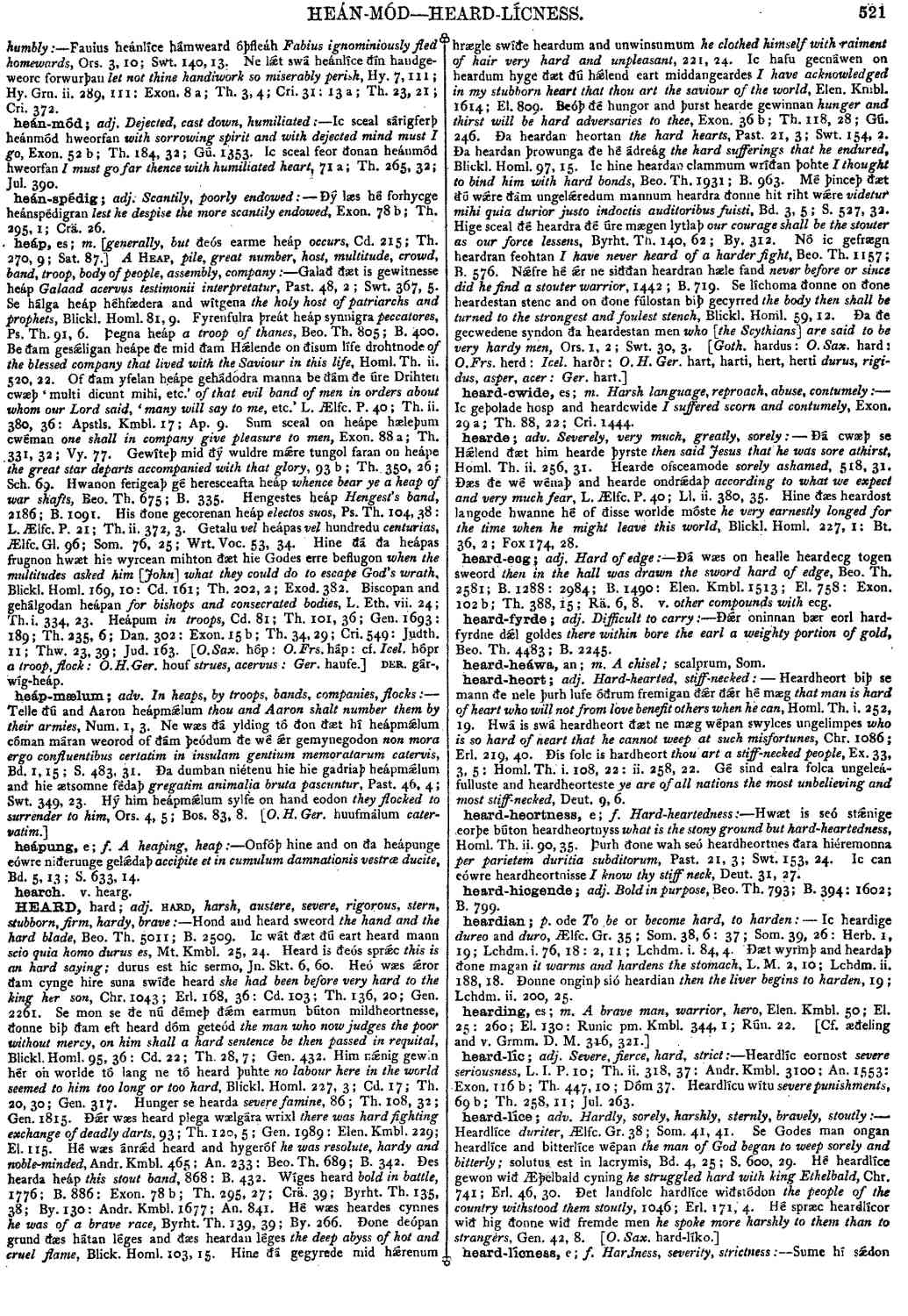HEARD
- adjective
-
Hond and heard sweord
the hand and the hard blade,
- Beo. Th. 5011; B. 2509.
-
Ic wát ðæt ðú eart heard mann
scio quia homo durus es,
- Mt. Kmbl. 25, 24.
-
Heard is ðeós sprǽc
this is an hard saying;
durus est hic sermo,- Jn. Skt. 6, 60.
-
Heó wæs ǽror ðam cynge hire suna swíðe heard
she had been before very hard to the king her son,
- Chr.1043; Erl. 168, 36: Cd. 103; Th. 136, 20; Gen.
2261.
-
Se mon se ðe nú démeþ ðǽm earmun búton mildheortnesse, ðonne biþ ðam eft heard dóm geteód
the man who now judges the poor without mercy, on him shall a hard sentence be then passed in requital,
- Blickl. Homl. 95, 36: Cd. 22; Th. 28, 7; Gen. 432.
-
Him nǽnig gewin hér on worlde tó lang ne tó heard þuhte
no labour here in the world seemed to him too long or too hard,
- Blickl. Homl. 227, 3; Cd. 17; Th. 20, 30; Gen. 317.
-
Hunger se hearda
severe famine,
- 86; Th. 108, 32; Gen. 1815.
-
Ðǽr wæs heard plega wælgára wrixl
there was hard fighting exchange of deadly darts,
- 93; Th. 120, 5; Gen. 1989: Elen. Kmbl. 229; El. 115.
-
Hé wæs ánrǽd heard and hygeróf
he was resolute, hardy and noble-minded,
- Andr. Kmbl. 465; An. 233: Beo. Th. 689; B. 342.
-
Ðes hearda heáp
this stout band,
868:- B.
432.
-
Wíges heard
bold in battle,
- 1776; B. 886: Exon. 78 b; Th. 295, 27; Crä. 39; Byrht. Th. 135, 38;
By. 130: Andr. Kmbl. 1677; An. 841.
-
Hé wæs heardes cynnes
he was of a brave race,
- Byrht. Th. 139. 39; By. 266.
-
Ðone deópan grund ðæs hátan léges and ðæs heardan léges
the deep abyss of hot and cruel flame,
- Blick. Homl. 103, 15.
-
Hine ðá gegyrede mid hǽrenum hrægle swíðe heardum and unwinsumum
he clothed himself with raiment of hair very hard and unpleasant,
- 221, 24.
-
Ic hafu gecnáwen on heardum hyge ðæt ðú hǽlend eart middangeardes
I have acknowledged in my stubborn heart that thou art the saviour of the world,
- Elen. Kmbl. 1614; El. 800.
-
Beóp ðé hungor and þurst hearde gewinnan
hunger and thirst will be hard adversaries to thee,
- Exon. 36 b; Th. 118, 28; Gú. 246.
-
Ða heardan heortan
the hard hearts,
- Past. 21, 3; Swt. 154, 2.
-
Ða heardan þrowunga ðe hé ádreág
the hard sufferings that he endured,
- Blickl. Homl. 97, 15.
-
Ic hine heardan clammum wríðan þohte
I thought to bind him with hard bonds,
- Beo. Th. 1931; B. 963.
-
Mé þinceþ ðæt ðú wǽre ðám ungelǽredum mannum heardra ðonne hit riht wǽre
videtur mihi quia durior justo indoctis auditoribus fuisti,
- Bd. 3, 5; S. 527, 32.
-
Hige sceal ðé heardra ðé úre mægen lytlaþ
our courage shall be the stouter as our force lessens,
- Byrht. Th. 140, 62; By. 312.
-
Nó is gefrægn heardran feohtan
I have never heard of a harder fight,
- Beo. Th. 1157; B. 576.
-
Nǽfre hé ǽr ne siððan heardran hæle fand
never before or since did he find a stouter warrior,
- 1442; B. 719.
-
Se líchoma ðonne on ðone heardestan stenc and on ðone fúlostan biþ gecyrred
the body then shall be turned to the strongest and foulest stench,
- Blickl. Homl. 59, 12.
-
Ða ðe gecwedene syndon ða heardestan men
who [the Scythians] are said to be very hardy men,
- Ors. 1, 2; Swt. 30, 3.
Bosworth, Joseph. “HEARD.” In An Anglo-Saxon Dictionary Online, edited by Thomas Northcote Toller, Christ Sean, and Ondřej Tichy. Prague: Faculty of Arts, Charles University, 2014. https://bosworthtoller.com/18470.
Checked: 0